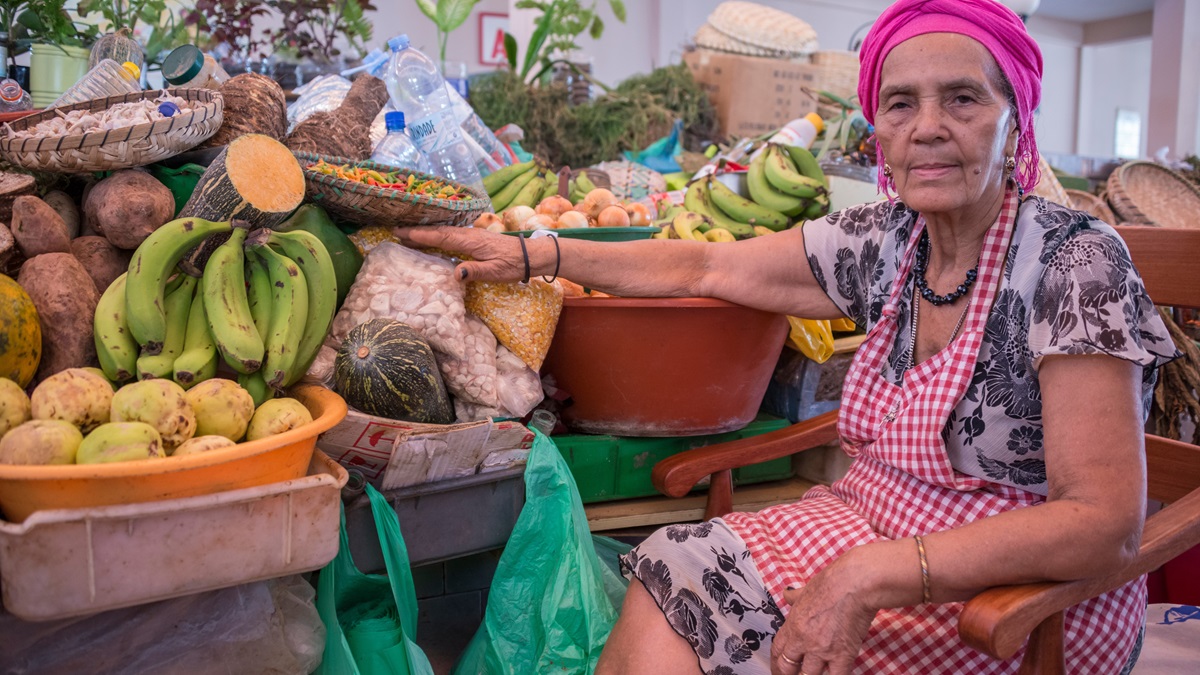By Paul Akiwumi, Director for Africa and Least Developed Countries, UN Trade and Development (UNCTAD)

© Shutterstock/Salvador Aznar | A vendor in the municipal market of Mindelo, Cabo Verde.
Small island developing states (SIDS) occupy limited terrestrial land area, yet boast substantial biodiversity and control nearly 30% of global ocean resources.
But their systemic and structural vulnerabilities to shocks have increased over the years, fuelled by a lack of economic diversification, remoteness, smallness and limited international economic interaction, including through trade. They have a high trade-to-GDP ratio, but they persistently record negative trade balances.
SIDS also suffer from a lack of resilience and vulnerability to external shocks: debt unsustainability and the inability to access financing limit their fiscal space and restrict private sector investment and growth. Environmental threats have also become more dire in the face of climate change and frequent disasters.
The imperative of crafting innovative solutions
Given the complex challenges, development solutions for SIDS need to be multidimensional and long-term. Leaders, policymakers and their partners must together kickstart a paradigm shift in development policy.
SIDS need to build productive capacities, which help countries grow and develop, facilitate stronger economic linkages among sectors and countries, enhance opportunities for economic diversification and stimulate entrepreneurship and job creation.
Policymakers in SIDS also need to prioritize local value addition, innovation and entrepreneurship, building on existing potential within traditional sectors including agriculture, fisheries and tourism.
SIDS should also harness opportunities in emerging, higher-technology industries, like in Mauritius, which has emerged as a financial and business services hub in Africa, leveraging its established financial regulatory frameworks and its well-educated and trained labour force. Mauritius also ranks among the best-connected African states, further enhancing its linkages with the rest of the continent and global trade partners.
SIDS’ comparative advantages in the services sector lie in shifting more towards knowledge-, skills- and technology-intensive services such as data transfer and digitization, banking and insurance services, and medical services (health tourism).
Key infrastructure-related productive capacities: energy, transport and ICT
Energy, transport and ICT are core areas of productive capacities critical for economic transformation and essential for the necessary infrastructure for high-quality goods and services. While SIDS have made some advancements across these areas in recent years, ICT capacity has registered notable progress (see the figure below).
SIDS also need to prioritize integrated climate-resilient infrastructure development given their heightened vulnerability to rising seas, droughts and frequent disasters, based on a comprehensive approach that balances the needs of today with the changing resource threats of tomorrow.
Water, water everywhere, nor any drop to drink?
Despite their relatively large ocean resources, paradoxically, the majority of SIDS also face water scarcity. Access to clean water for a healthy population should be balanced with support for production activities. Water and energy shortages limit local productive capacities and act as a barrier for local businesses.
Moreover, sufficient and sustainable water resources are important inputs to the tourism sector, a major economic activity for many SIDS. Securing a workable supply of water and energy is thus fundamental to sustainable economic, environmental and social development.
Desalination can be part of the solution to water shortages. But with high energy tariffs, desalination of seawater can be a costly and resource-intensive exercise. Cabo Verde has made important progress in tackling this challenge, leveraging its renewable energy resources to reduce operational costs.
Desalination has been ongoing for more than 50 years in the country and now provides nearly 70% of the nation’s potable water. Thanks to a recent investment in a solar-powered desalination plant in Maio, the country’s capacity to produce fresh water has more than doubled from 300 cubic metres to 800 cubic metres daily.
Combining renewable energy with technology-based solutions for water desalination can be a workable solution for SIDS facing similar challenges, while supporting sustainability efforts.
The urgency of working together
SIDS should be supported to achieve their national and international development targets through a committed multilateral cooperation environment and partnerships that meet the scale of their challenges.
Despite three decades of international recognition of SIDS’ vulnerabilities, and three accompanying global programmes of action, they remain a unique and pressing case for sustainable development.
The upcoming 4th International Conference on Small Island Developing States will be a watershed moment for these highly vulnerable economies. With the international development community’s renewed focus on climate adaptation, the time is now to write a new narrative for the future of SIDS – one built on a strong foundation of domestic productive capacities and that ensures their sustainable development and lasting prosperity.
This article was first published on 20 May by the Caribbean News Service.


